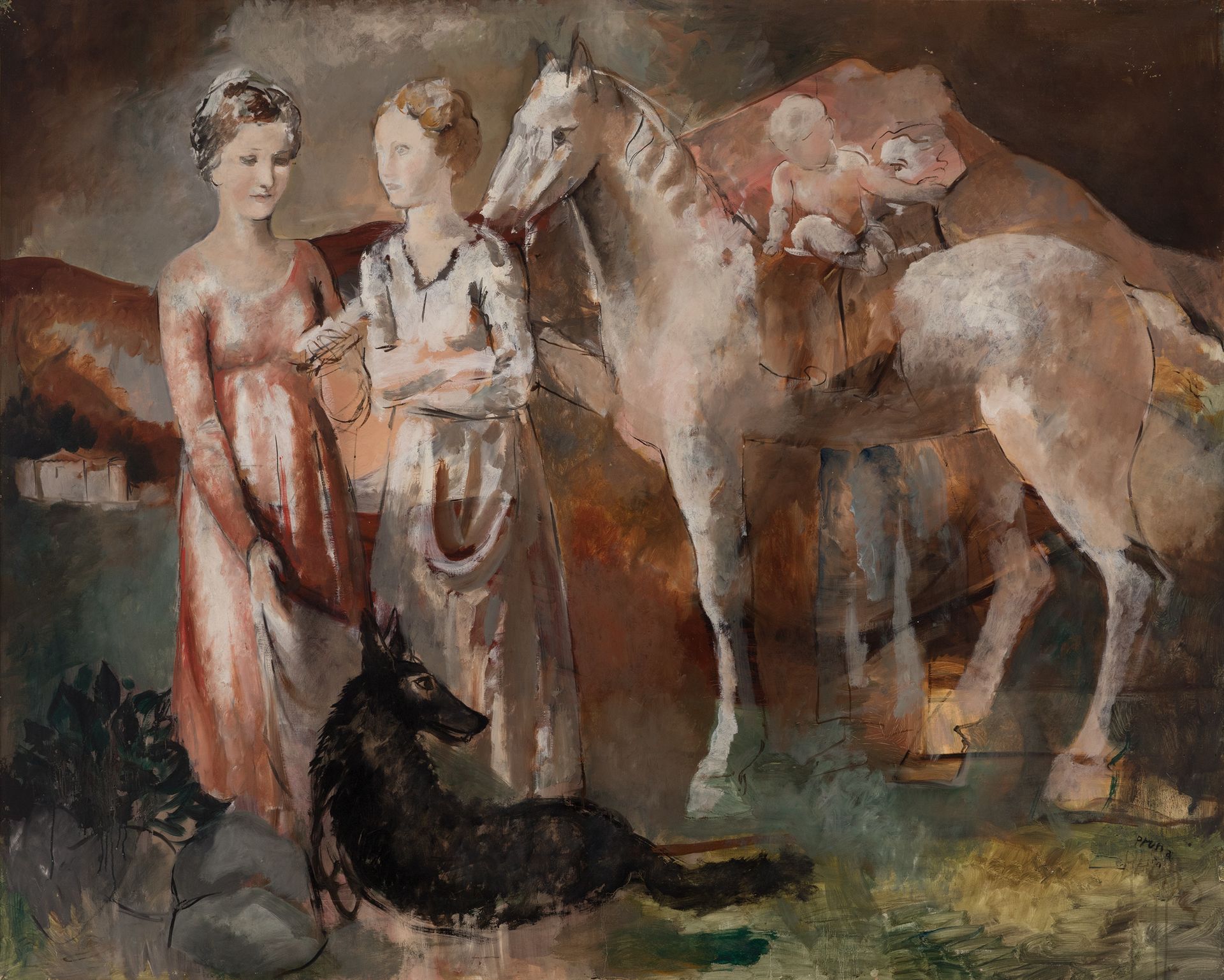Description
PERE PRUNA OCERANS (Barcelona, 1904 - 1977)._x000D_
PERE PRUNA OCERANS (Barcelona, 1904 - 1977)._x000D_ "The White Horse", 1930._x000D_ Oil on canvas._x000D_ Collection stamp on the stretcher._x000D_ It has slight faults on the edges and corners._x000D_ It has faint restorations._x000D_ Titled on the back in the central stretcher. Signed and dated in the lower right area._x000D_ Measurements: 130 x 162 cm; 138 x 170 cm (frame)._x000D_ The decade of the thirties was a period of consolidation in the career of Pere Pruna, who, thanks to the prestige he achieved through his artistic collaboration in Diaghilev's ballets, managed to gain a foothold among the collectors of the Catalan bourgeoisie. Influenced by the artistic environment he was experiencing in Paris, Pruna relegated the famous Cubism in favour of a return to classicism, as can be seen in the present work. This classicism is reflected in the conception of the figures, the frieze-like composition of the scene, and the country theme of the scene._x000D_ A mainly self-taught artist, Pere Pruna completed his training at the School of Fine Arts in Barcelona. After beginning to exhibit in Barcelona when he was still very young, he travelled to Paris in 1921, where he was helped and guided by Picasso. In the French capital he held a successful one-man show at the Galerie Percier, and came into contact with intellectuals such as Cocteau, Drieu la Rochelle, Max Jacob and others, with whom he founded the magazine "Philosophie" in 1924. Serge Diaghilev, who visited one of his exhibitions, also asked him to create the sets and costumes for the ballet "Les matelots" in 1925. From then on, he also worked on other musical works, such as "La vie de Polichinele" (1934) and "Oriane" (1938), among others. In 1928 he won second prize in the Carnegie Institute exhibition in Pittsburg and later, on his return to Barcelona, he won other awards such as the "Montserrat seen by Catalan artists" competition (1931) and the Nonell Prize (1936). The latter was surrounded by controversy, because Pruna won it for his oil painting "El vi de Chios", for which he used a photograph published in a Parisian pornographic magazine as a model. In response to the uproar, Pruna withdrew the prize, but the jury upheld its decision. Following the outbreak of the Civil War, Pruna settled in Paris and continued his international exhibition activity, most notably the exhibition organised in London in 1937. At the same time he worked for Ridruejo's propaganda services, with works such as the poster commemorating the promulgation of the Labour Force, and Eugenio d'Ors, National Head of Fine Arts, introduced him to the Spanish representation at the Venice Biennale in 1938. After the war he combined easel painting exhibitions with mural painting, a genre in which his work in the Monastery of Montserrat was particularly celebrated. In 1965 he won the City of Barcelona Prize, and three years later he was appointed academician of the Far de Sant Cristòfor. His style, centred on a graceful, stylised female figure, is based on the clear delicacy of the pink and "neoclassical" Picasso, and reveals a certain parallelism with the Italian Novencento, being fully in keeping with the classicist trend that appeared in Western art after the first wave of avant-gardism and of which his friend Cocteau was the driving force. Pruna focused on portraiture and above all on the female figure, capturing images marked by great delicacy and sober distinction. His representations are characterised by a stylised, diaphanous line, and are in tune with the return to order that followed the rupture that Cubism represented in France, thus linking directly with the avant-garde. Pere Pruna is currently represented in the Museum of Montserrat, where there is a space bearing his name, the MACBA in Barcelona and the Maricel Museum in Sitges, among others.
79
PERE PRUNA OCERANS (Barcelona, 1904 - 1977)._x000D_
